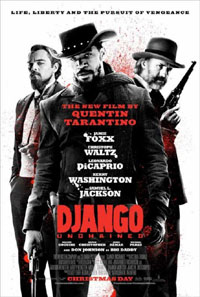 DJANGO UNCHAINED
DJANGO UNCHAINED(R)
**** (out of 5)
December 25, 2012
STARRING
Jamie Foxx as DJANGO
Christoph Waltz as DR. KING SCHULTZ
Leonardo DiCaprio as CALVIN CANDIE
Samuel L. Jackson as STEPHEN
Kerry Washington as BROOMHILDA VON SHAFT
Directed by: Quentin Tarantino
BY KEVIN CARR
Listen to Kevin’s radio review…
Even though he’s often lauded by critics and audiences alike, Quentin Tarantino is a very divisive filmmaker. Even for people who enjoy his movies, there’s often great arguments about which of his movies are his best.
Personally, I liked Quentin Tarantino’s earlier work. Once he emerged from the success of “Kill Bill,” it was clear that the greatest fan of Tarantino’s writing was Quentin Tarantino himself. This was evident in the overlong and tedious dialogue scenes in “Death Proof” and the well constructed but often bloated meant-to-be-suspenseful talking scenes in “Inglourious Basterds.”
It’s nice to see Tarantino return to form a bit with “Django Unchained.” Sure, it’s got all the elements of his recent films. It clocks in approaching three hours. It’s got quite a few dialogue scenes. It’s loaded with cameos, it pays direct homage to 70s exploitation films and it’s really nothing more than Tarantino having fun with his style.
Still, it’s not trying to be as significant as “Inglourious Basterds” was, and it’s got a far better cast than “Death Proof” had. “Django Unchained” is meant to be a bloody, wild ride with a heavy-handed delivery, and there’s where it shines.
The film tells the story of a former slave named Django (Jamie Foxx) who is given his freedom by a bounty hunter named Shultz (Christoph Waltz). The two team up as a bounty-hunting pair, then set their sites on freeing Django’s wife (Kerry Washington) from an eccentric plantation owner (Leonardo DiCaprio) to whom she had been sold as punishment for an escape attempt.
Where “Inglourious Basterds” kind of went off the rails with how many genres it was trying to pay homage to (e.g., spaghetti westerns, war movies, propaganda films), “Django Unchained” is a little more focused. It’s really a direct homage to spaghetti westerns with plenty of elements of the revenge flick thrown in. I haven’t seen the original “Django” movies, but if anything, this film makes me want to.
Of course, it’s a Tarantino movie, so that means it’s going to be filled with lots of dialogue. However, Tarantino balances these scenes as well as he did with “Pulp Fiction.” Waltz plays essentially the same character as he did in “Basterds” – only he’s a good guy and not a Nazi in this film. But he still comes off as the uber-polite and friendly character who has a bit of a dark side.
But unlike “Basterds,” which featured an exhausting number of monologues, “Django Unchained” limits these in time and pacing. It also staggers action throughout the film, which is more in line with the 70s film homage than he has in previous movies.
The cast is fantastic – aside from what has to be the worst director cameo ever filmed – and everyone holds their own. The film also includes some delicious cameos, which aren’t too obvious, so stick around for the end credits to see who was whom.
Amid all of these fun moments are some solid dramatic and emotional scenes. Even the dialogue suspense has a little more going on behind the words than I’ve seen in the fast. But the real punch of this movie is the over-the-top action and violence that makes it a cartoony, bloody, fun ride.
Are there problem areas? Sure, but there’s a bulletproof nature in making an homage to this kind of film. Everything that is a problem – some scenes that run long, overly violent action, awkward characters silliness, over-the-top sound mixing – is forgivable in the context of what this film is sending up.
In the end, “Django Unchained” is actually a better grindhouse tribute film and spaghetti western homage than his previous two movies combined.
Podcast: Play in new window | Download
